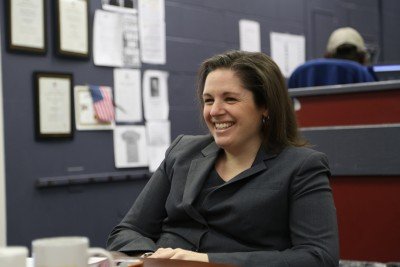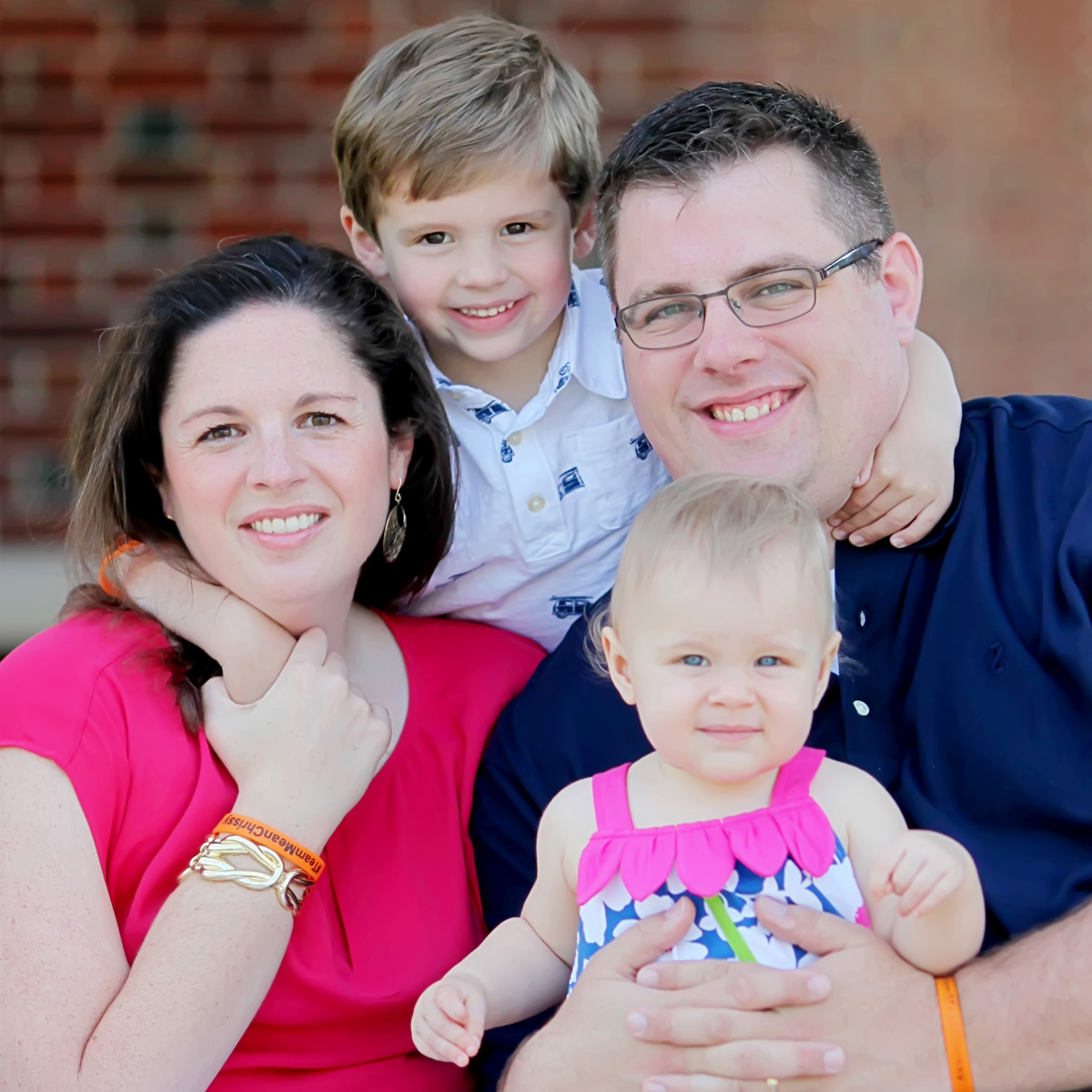Christine’s Story
Christine Buttigieg had never heard of appendix cancer. Then, she was diagnosed with it in 2015 after her appendix nearly burst and had to be removed. Christine quickly learned that most oncologists are not experienced these kinds of rare cancers. One surgeon she consulted with had seen just one case in 10 years. About a week after her diagnosis, she discussed treatment options and a clinical trial with an MSK doctor who cares for over 100 people with appendix cancer each year.

Editor’s Note: Christine has since required additional treatment. Learn more about how she’s coped with cancer recurrence.
Christine Buttigieg had never heard of appendix cancer. Then she was diagnosed with it in 2015, just eight months after having her second child. Her local hospital discovered the disease after her appendix nearly burst and had to be removed.
The busy 34-year-old, who is as an assistant news director at the CBS affiliate in Albany, had barely begun to process the range of emotions before her journalistic instincts kicked in. She knew she needed to arm herself with reliable information about her diagnosis, her treatment options, and places she could turn to for help.
Getting to Know a Rare Cancer
Christine initially went online to learn more about appendix cancer but quickly realized that very little information is available about this rare disease. It affects fewer than 1,000 Americans every year — 90 percent of whom are only diagnosed after their disease has spread and advanced to stage IV.
She also learned that most oncologists are not experienced in treating these kinds of rare cancers. “One surgeon told me that he only sees appendix cancer cases about once every ten years,” she recalls.
About a week after her diagnosis, she met with MSK surgeon Garrett Nash, who cares for over 100 people with appendix cancer each year. They discussed her treatment options, which included surgery, chemotherapy, and the possibility of enrolling in a clinical trial — an opportunity to access new drugs and therapies years before they are available anywhere else.
The three-hour commute from her home to MSK was a top-of-mind consideration, given that she had two young children. “I knew that MSK is the top cancer center in the country, so that’s where I needed to go, no matter what that meant logistically for us,” remembers Christine. “This was literally going to be the decision that could save my life. Wouldn’t I want to go to the best hospital in the country?”
A Lifesaving Decision
After waiting ten weeks to allow the inflammation from her appendectomy to subside, the plan was for Christine to have the right side of her colon removed. Based on her scans and the report from her appendectomy, Dr. Nash believed that her cancer had not yet metastasized, or spread. To be sure, he would need to perform a procedure to explore her abdomen for cancer that might have spread to nearby lymph nodes and the abdominal lining (called the peritoneum).
Dr. Nash stopped the surgery after discovering four tiny spots on the peritoneum. This metastasis meant that Christine now had stage IV disease and would need more-extensive treatment.
An intensive, six-month regimen of systemic chemotherapy, given intravenously, followed by surgery was recommended by Dr. Nash. Additionally, he advised that she receive intraperitoneal chemotherapy (IPC).
“I’m a very information-driven person and I want to know every possibility and plan for everything,” Christine says. “It has brought me an immeasurable amount of comfort having a physician who took the time to get to know me as a patient, is honest with me, and is so accessible and responsive to my questions every step of the way.”
Considering a Clinical Trial
Six months of chemotherapy gave Christine time to consider volunteering for a clinical trial. Patients participating in clinical trials get access to treatments not yet available elsewhere, in addition to the standard cancer care they are already receiving. Christine’s trial is a landmark clinical study to assess the effectiveness of treatment for people with appendix cancer worldwide.
The opportunity to contribute to the scant evidence available for a rare cancer resonates with many patients. Approximately 80 to 90 percent of eligible patients treated for appendix cancer at MSK choose to enroll in this clinical trial, whereas most trials see about 20 to 30 percent, says Dr. Nash.
“Personally, I like being part of a study that’s going to yield some results on my cancer and that might also help guide my treatment decisions down the road if I ever have a recurrence,” says Christine.
Dr. Nash and medical oncologist Andrea Cercek are leading the study, which evaluates two methods of administering IPC. The first method is early postoperative intraperitoneal chemotherapy (EPIC), where chemotherapy is delivered for three days immediately following surgery. The second is hyperthermic intraperitoneal chemotherapy (HIPEC), where chemotherapy is heated to boost its effectiveness and infused into the peritoneal cavity immediately after surgery.
“There are data that support the potential effectiveness of each type of IPC, but no evidence to help select which therapy a specific patient would benefit from — which is one reason why this clinical trial is so important,” says Dr. Nash.
Christine was worried about the small mortality rate associated with HIPEC. “Fortunately we’ve never had a patient die undergoing this treatment at MSK, but other high-volume centers report a very low mortality, likely from surgical complications rather than from the chemotherapy,” says Dr. Nash. “Fully understanding what potential risks and benefits you can expect is key before you accept any treatment in a clinical trial.” Asking a lot of questions helped Christine decide what was best for her. Knowing the facts, she felt confident about her decision to enroll in the clinical trial. “I could possibly get this treatment that seems to show promise at a safe facility with a doctor I really trust.”
Maintaining Quality of Life

She experienced several side effects from the intravenous chemotherapy, the most severe of which was neuropathy, a nerve disorder that can cause weakness, numbness, tingling, and pain.
“At the end of the day, if that helped me at all get rid of cancer, then that’s a small price to pay in my book,” says Christine, who was able to continue working through most of her chemotherapy treatment.
Throughout her treatment, Christine received invaluable support from her husband, Mike, who accompanied her to every doctor’s appointment and chemotherapy session, and from her parents, who helped with the kids. “That was important because there were times when I was so sick from chemo I couldn’t be positive, but I needed positive people around me,” recalls Christine.
Living Life with Optimism
Christine will be monitored closely by her team at MSK with CT scans and blood tests for signs of cancer recurrence.
With treatment behind her, she feels more optimistic now than she has been since her diagnosis one year ago. “I had been so busy preparing my family for my passing that I never thought I might actually be cured,” she says. “I’m working full-time again and I’m taking care of my kids, so everything is good!”




